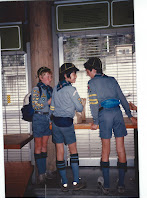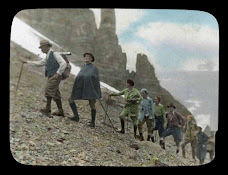It would surprise me if anyone reading this does not know what is going on with MEC. If not, in short:
- MEC, Canada's largest consumer co-operative is poised to be sold to an American private retail firm (correction HAS been sold)
- Members are shocked and calling foul on the lack of process followed by the board that led to this and trying to mount a campaign to "save the co-op" in one way or the other (and if that is your thing check out Kevin Harding's posts on the SaveMEC Facebook group)
A good collection of articles has been assembled in the latest Wanderung newsletters by my friend Andy Gibb but here are 2 to get you started.
Like most of us, for me, this was something I did not want to see happen. There is no doubt that for "self-propelled" active Vancouverites, MEC was THE major hub of events, gear, and even funding and a perceived ethical leader in the space.
MEC in my life
MEC is woven into my life more than any other organization that I've not worked for directly and I think this is the case for many Vancouverites.
I became a member in 1984 when I was in scouts and needed to start assembling hiking gear. My parents took me to the Co-op so I would not freeze to death on a winter trip to Elfin Lakes and since then, there is probably no single store I've spent more of my money in than Mountain Equipment Co-op (I still call it that so suck it!).
For most of the 80s and 90s MEC was just a great store that presented great value and was aligned with my interests. Most of my casual clothes came from there as did all of my outdoor gear before I started to get more picky with brands etc., Christmas shopping lists for me, were mostly addressed here.
In the 90s my sister Wendie worked there in HR and at the time I could not think of a cooler place to consider working (and the discounts!). This was my first exposure to companies with a philosophy of promoting work/life balance and actually having a policy of unpaid time off to "go explore". In 1999 I explored a BCIT IT workterm working at MEC but discovered their computing environment offered too little in experience due to being too outdated. Both of these events exposed me to information that gave me early hints that "the Co-op" was not the most streamlined ship in the world as a business and that in some cases, true professionals chafed there.
In the early 2000s I had a personal re-birth regarding my interest in the outdoors and with my friends started the Vancouver based outdoor activity group: Wanderung.ca
I funded Wanderung initially by buying used equipment at the "MEC Garage Sale" (a yearly event for me not unlike other major holidays), and flipped it for profit. Later, MEC generously entered a very casual agreement with us (now a non-profit with a board) to provide all of the operating costs for close to a decade (for those unaware, this was the case for hundreds of small non-profits in the outdoor activity space).
In 2014 I went 3 rounds of interviews and it looked like I was finally going to get to work at MEC. In a horribly handled HR blunder, I was even shown my future desk at the West 5th HQ and all but promised an offer was coming,.. when the job was then given to someone else. That left a very bad taste in my mouth.
Fast forward to recent years where the funding for Wanderung was cut, and MEC itself has ventured into activities of less interest to me. Their own products became of less interest to discerning outdoor enthusiasts overall and the dividend cheques (remember those?!) were something you only ever heard about in connection with REI. They rarely carried the product lines I cared for as time progressed.
Leading up to the big announcement, MEC was still a major shopping destination for me, but more for "supplies" like gas and freeze dried meals. They still also offered the odd lowest price for something I was searching for (more on that shortly). I cannot deny their leadership in sustainability etc. but I no longer feel like a member of the cult of MEC as I once did. In recent times, I tried but failed to boycott them for a variety of reasons, rumours of election funny business not withstanding. For me, MEC was already a few notches past being something worth saving (if that is even possible). I've signed the petition but chosen not to fight it any harder.
Alternatives to MEC
I have chosen not to focus on saving MEC. There is zero doubt that the community centre and thought leadership aspect of the Co-op is a major national loss. Their support of nature, events, and sub-communities is unparalleled, and I doubt there will be anything to replace that. That said,.. that ethical core was showing signs of erosion so perhaps it is time to seek values alignment elsewhere in the community to soften the blow of devastating losses along these line going forward. At the very least, let's not put all of our emotional hopes and dreams about sustainable recreation etc. in one basket anymore. Let's take what old MEC started and run with it.
The rest of this post is meant to be a potential life preserver for those in Vancouver that feel the loss of MEC is part of this sad global slide into environmental implosion and a slide further into faceless corporations having a hand in everything. All is not lost.
Community
If MEC is part of your fix for a sense of local community,.. I hear you. Club nights, gear sales, sponsored events...all of it has been an amazing asset to quality of life in Vancouver. It does seem unlikely that a US Corporation will be be able to emulate that function from a genuine place. For that, this is what I'm suggesting:
MEC has incubated hundreds of local organizations from hike clubs like Wanderung (which probably can really pay for itself) to subsidizing programs providing outdoor leadership to marginalized women in the DTES.
If you are reeling because eventually you might not be able join an MEC organized paddleboard event,.. stop going to directly to MEC for these things,.. look to those grassroots organizations directly,.. or better yet..
start your own. Did MEC not teach us to be self-sufficient in our back-country adventures? The people that started MEC, I hate to say it, are mostly not with us anymore, and many of the people that took it over,.. well, we know that story.
On that topic,.. don't forget that MEC hurt, as much as helped, the local race scene. Sure they sponsored a huge amount of events, but many felt they also undercut an already limited market so the more unique homegrown events struggled and many disappeared possibly in part to un unnaturally saturated market.
This is the time to consider what you do for your current and future communities to replace what MEC did for us in decades past. Places like HUB Cycling needs volunteers as does The Lady Alliance (depending on your skillset). There are all sort of clubs to join,.. MEC is not the sole pipeline to them,. the internet is. Never before have we had inexperienced hoards of people ruining the back-country as we do now. People are in need of education: join one of those organizations and help them.
Political Values
Co-ops in general are a very left-wing concept. They make you feel as if you have a stake (and you should!) but also there is the promise that profits go somewhere more desirable if not back into your own pocket. That appeals to me.
A co-operative is a legally incorporated organization that is owned by its members, who use the co-operative's services or purchase their products. They can and do provide virtually every product or service, and can be either for-profit or non-profit enterprises.
Co-operatives are community-focused businesses that balance people, planet and profit. They are democratic and value-based by nature, and are often formed to fill a void within a community, to seize local opportunities and to meet the needs of its member-owners. Whether the members are the customers, employees or residents, they have an equal say in what the business does and an share in the profits. Profits are distributed to members based on the amount of business they do with the co-operative.
As such, co-operative businesses keep dollars circulating within the local economy, provide secure employment, and help revitalize, build and sustain healthy communities.
In Canada, MEC and similar organizations get tax breaks due to their status. In theory that gives more opportunity to give back and that is the case with MEC but that seems threatened with this buy-out.
If that part of MEC being lost is what ails you, perhaps this can be your substitute:
- US based REI is still a consumer co-operative. Not local,.. but they are a parallel for what we have with MEC and I think people can still feel "ok" about $ they spend there. If you question their distance from a faceless corporation or your core values, consider this recent article where they surely risk profits by supporting used gear stores.
- There are all sorts of consumer, worker and producer co-ops around us in Vancouver. Doing business with these kinds of businesses is something all of us should do more of if we truly believe in re-investing locally.
...you need to know something else. MEC's presence as a Co-op was not all positive. The best example is the local bike shop scene. Most people do not buy a bike more than once a decade. That means bike stores depend on the sale of supplies and accessories, and of course, repairs.
When MEC entered that market in 2010 with their subsidized ability to undercut any pricing, it was devastating to bike stores. MEC's own bikes were a minimal concern compared to the clothing, lights and repair pricing advantages and the fact you could just pickup that spare tire when you were getting your camp food and butane. MEC is effectively Walmart in this arrangement and combined with impossible Vancouver rents surely put crippling pressure on the local bike store scene which, by the way, are almost all locally owned. Many folded and cited the govt. tax breaks of MEC as an unfair advantage.
So,.. losing MEC might have an upside and it might allow an important market to breathe and grow under more natural conditions. In some areas they were never an alternative to the big box stores,.. they were the alternative to other local businesses.
Sustainability
If MEC's environmental outlook was your thing, it was probably for good reason. They were a leader in the space for considering supply chain and ethical sourcing of products and for the most part walked the walk. In later years, however, we all got a bit more sophisticated in understanding those risks and the true costs of product development had more critical eyes on them.
To this, I say look at the manufacturers themselves and less to a large store than might have green products on the shelf next to a pressure molded piece of plastic that surely was shipped in bulk from China with zero consideration for environmental or social costs.
Patagonia is a company that arguably leads the way with
social responsibility. Sure it is not all roses, but they certainly seem to try to improve year over year and even close off entire product lines, like shoes, when they feel they cannot source or manufacture them sustainably.
For me,
Icebreaker is the source of most of my clothing and I can feel good about it. Yes, they manufacture in Asia and are pricey, but the product itself is:
- produced as naturally as possible
- above average manufacturing conditions for workers
- is shipped with less plastic involved (mostly recyclable cardboard)
- and unlike even cotton or plastic based textiles,.. the product itself can actually be recycled or will "rot" without harm in landfill
And lets not forget, they just make great stuff (that fits me!),... I'm a fan and don't mind paying more and was well over MEC's boxy poorly manufactured house brand years ago.
Shop local
I've touched a bit on shopping local, but really if you are serious about hoping that your outdoor spending dollars remains in the community, you have options. The same goes for non-local companies that employ British Columbians.
BC probably doesn't manufacture many if any of the products you buy,.. but the locally owned resellers are plentiful. Here are a selection of locally outdoor outfitters (I'd rather put these people's kids through school or buy their boat than some American tycoon). Let's hope they can all make it through this economic crisis. I've included my comments of what they are good for in my opinion.
Valhalla Pure - BC and Alberta only, covers a broad range of product lines for clothing and gear
Alpine Start Outfitters - I
think they are local, and I really have found them to be stepping up as one of my faves (I did not use to be a fan but their staff are awesome and I hear they employ the famous Danish Meindl boot guy that used to be across the street from MEC). Great COVID discipline too.
JV bikes - fills much of the bike accessory space in my opinion and independent.
Atmosphere is Canadian, and may cover some gear and clothing gaps left by MEC but I feel is verging on big-box/Canadian Tire style - difficult to say if that money will recirculate locally (but WHY did they close the Kits location?!).
MSR,.. not Canadian but has a formidable repair and support centre in Kamloops and really sets the bar high for not treating British Columbians as 2nd class citizens. I feel good about them.
The following organizations are probably your BEST bet for local spending. They are either actively developing ethical jobs in their communities, or at least community leaders and great resources for their respective activities.
SideSaddle - women focused, VERY ethical employers, community builders, just awesome.
One thing I've noticed too, is the above places employ people that are engaged and knowledgeable. I feel that was an MEC thing in decades past, but less so now.
Lastly, cottage industries are another way to buy more ethically they are usually people making something more specialized out of their basement. The classic use case here is ultra-lite gear. If this grabs you, check out this
directory.
Wrap-up
I don't want to tell anyone where to shop but I think people need to know there are better options than going to Amazon. Sure MEC's profits did make it back to the community, but your choices can still ensure that some element of that continues.
I want to take this turn of events to re-enforce a path I was already on, one to: buy local, buy sustainable, and consider investing time in developing local alternatives for events and clubs. There is no better way to ensure a healthy local outdoor community than to participate in building it (or re-building it), and you surely will have more of a voice in shaping the direction of something local than you will with the "future" MEC.
.






































